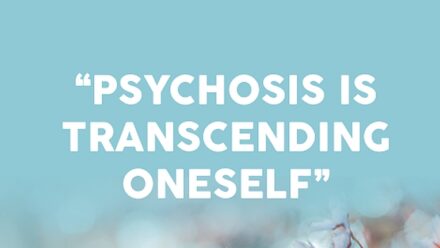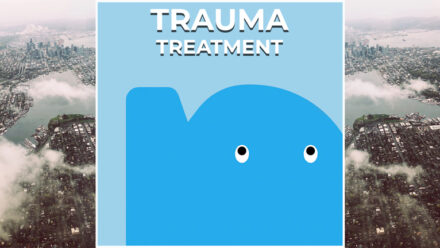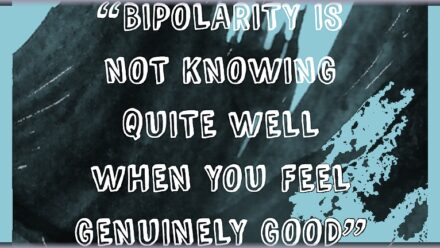
Rianne thinks that everyone is familiar with it: Conflicting inner thoughts. On the one hand your mind says one thing, and on the other hand your mind says something else, often the opposite. It’s like there’s a little devil sitting on one shoulder, and an angel on the other. “It was absolutely exhausting.”
People with an addiction will undoubtedly recognise this, just like people with eating disorders, and people with depression. On the one hand you know you should really get up now, but on the other hand, your bed feels really comfortable and safe, and you don’t have the energy to get up. It’s like you hear several voices that tell you what to do, and you feel torn between them. Your thoughts telling you you should really eat something because you know your body needs it, and thoughts that tell you you’re not allowed to eat, because you’re fat and you don’t deserve food.
Conflicting inner thoughts
Internal conflict made me bone tired. The never-ending tug of war within me, the divisiveness. I didn’t know which voice in my head to listen to, and I didn’t know what I really wanted deep down. By applying the three principles (three universal principles that make human experience possible – the mind, thoughts, and consciousness), I learned that I am not my thoughts, and that I actually don’t have to do anything with my thoughts. I learned how to observe and examine my thoughts (which I don’t always manage to do). Talking about my various thoughts one at a time, also gave me an insight into what was happening. Not because I am two or more separate people, because I am one, but because the language is metaphoric and it can help me express my internal process.
Sometimes, our thoughts can be those of a perpetrator
In our lives, we can come across people who abuse, insult, denigrate, or dominate others. I actually believe we are all guilty of something to some degree. But sometimes, children are bullied for longer periods of time. Or parents consistently neglect their children. Or even worse, call them names like ‘little brat’, or say things like “you’re an evil child”. Physical violence happens, just like other similar messages can be sent to a child. In these cases, the words of the culprit can become our inner thoughts. Children will think it’s their own fault that other kids treat them that way. I was badly bullied in primary school, and the messages that the bullying sent me became my own inner convictions. I was weird, too sensitive, and too serious. My body went through some changes quite early and I often got insults hurled at me. Or the bullying was non-verbal; kids stared at my breasts rather than look me in the eye. They tried to kiss me against my will, or they smacked me on the bottom. Once, a grown up man thought it was alright to touch my bum without my consent.
It became the foundation of my conflicting thoughts. My mind told me to be strong, and to get over it. But at the same time I wanted to be less feminine, and these and other incidents resulted in me drastically losing weight as to lose my female curves.
The clash of thoughts continued
because I found it too difficult to talk about what was really happening to me. The loneliness that this struggle inside of me brought with it, made me look for coping strategies, and I started exercising excessively, binging and purging, and harming myself by auto-mutilating.
Talking about my thoughts separately and one at a time can help you gain insight. Despite all these different experiences, thoughts, and emotions I am still one person, even though I didn’t know this back then, and nobody taught me this. I thought there was something wrong with me. But I am not my experiences, neither my thoughts nor my emotions. I am the spirit. There is always a healthy part, it is the resilience within us, the life force that wants to grow, the soul, or the essence.
But there was also a trauma part, this part contained pain and sadness caused by the situations I found myself in. This part of me felt all alone, and hurt. The survival part wanted to protect it, and to not feel the hurt it caused. So I started losing weight, purging, exercising, and cutting myself, to not have to feel the pain of the trauma.
These parts of me (and all the thoughts that came with them) were conflicted
Whilst the healthy part in me wanted to live and exist, the trauma part felt so lonely and torn between al its thoughts. And the survival part preferred to deny, flee, fight, and not feel. Back then, it helped me gain insight into my thoughts and feelings. I was much more compassionate towards myself, rather than hard on myself like I’d always been. We can apply this way of looking at things to many more situations. For instance, take the clash of thoughts a depressed person may feel, about getting out of bed. A depression really is a suppression of all feelings. It is a survival strategy, to not having to feel what is really hurting you, and staying in bed protects you against new pains that you may experience in life. It isn’t about right or wrong, but about asking ourselves where certain beliefs come from.
At the time, I had a pretty distressing thought, that I would be better off not being here. Plus, I was hearing voices that told me that I had to be destroyed. This thought or voice (that sometimes resulted in me acting on it), was in fact, a survival strategy as well. I didn’t want to feel the intense pain and trauma of the not being allowed to exist the way I am. It was also the internalised voice of of the culprit. If I weren’t here any more, then I wouldn’t have to feel this pain any more.
You can use this trauma model in all situations to gain more insight into your thoughts and feelings.
Nowadays, I have been happy and healthy for twelve years, and by learning about trauma I understand so much more about my childhood. Why certain things happened to me, and how different thoughts and feelings worked within me.
What I love to see
is how to really get it through to our souls, that we are not our thoughts. We have thoughts, and we are the ones that can listen to our own thoughts. At any moment we can feel which thought we want to act upon, and which one we don’t. We are free! We are carried by our resilience, autonomy, and essence. Insight into how your thoughts work, your traumatic experiences, and who you really are, gives you freedom at any given moment.





Comments: